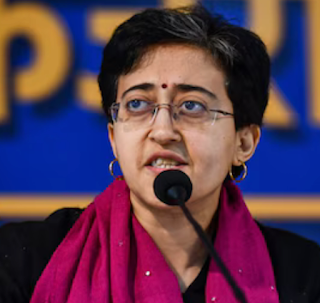New Delhi, February 8, 2025 - In a dramatic turn of events in the Delhi Assembly elections of 2025, Atishi, the incumbent Chief Minister of Delhi, managed to secure a victory in the Kalkaji constituency, providing a glimmer of hope for the Aam Aadmi Party (AAP) amidst a broader wave of losses.
Atishi, who stepped into the chief ministerial shoes following the resignation of Arvind Kejriwal due to corruption charges, faced her electoral test in Kalkaji. Her win here was not just a personal victory but a significant moment for AAP, which saw several of its key figures, including Kejriwal, losing in their respective constituencies.
Kalkaji's election results were closely watched, given Atishi's debut in the 2020 elections where she also emerged victorious. This time, she was pitted against BJP's Ramesh Bidhuri and Congress's Alka Lamba in a fierce three-way contest. Despite the intense campaigning and the charged political atmosphere, Atishi managed to retain her seat, defeating Bidhuri by a slim margin of over 900 votes, a stark contrast to her previous win by over 11,000 votes.
The context of this election was particularly poignant. Kejriwal's resignation and the subsequent corruption allegations had cast a shadow over AAP's campaign, with the opposition parties leveraging this narrative to question the integrity of AAP's governance. However, Atishi's victory in Kalkaji served as a beacon for the party, demonstrating that despite the controversies, there was still significant support for AAP's policies and leadership at the grassroots level.
Atishi's campaign focused on her track record in education reform, health services, and infrastructure development, resonating with the voters of Kalkaji. Her personal narrative of resilience, especially in light of the political turmoil, seemed to have struck a chord. Her emotional response to personal attacks during the campaign, particularly regarding her surname "Marlena," also humanized her figure, possibly swaying voters who appreciated her authenticity and commitment to public service.
This election result in Kalkaji thus stands out as a saving grace for AAP, which otherwise faced a challenging day at the polls. It underscores Atishi's growing stature within the party and the state, potentially positioning her as a central figure in AAP's future strategies. Her win might also be seen as a vote of confidence in her leadership, especially after taking over under such contentious circumstances.
However, the broader implications for AAP cannot be overlooked. While Atishi's win is commendable, the party's losses elsewhere indicate a need for introspection and perhaps a strategic overhaul. The electorate's mixed response might suggest a divide in public perception regarding AAP's governance and the personal integrity of its leaders.
In the coming days, the focus will be on how Atishi leads the party forward, managing both the immediate aftermath of this election and planning for the future. Her victory in Kalkaji could serve as a rallying point for AAP, but it also places a significant responsibility on her shoulders to address the party's vulnerabilities and rebuild trust among Delhi's voters. Whether this win marks a temporary reprieve or the beginning of a resurgence for AAP remains to be seen, but for now, Atishi's triumph in Kalkaji is a moment of pride and perhaps, a new beginning.
